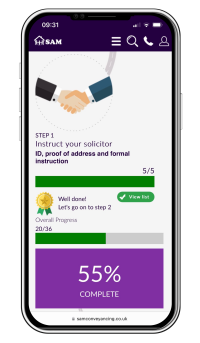How to prove source of funds
It could be a gifted deposit from your parents, an inheritance from a deceased relative or even money held in an overseas bank account.
Legitimate proof of funds for buying a house is essential, and getting it wrong can cause delays, further investigation or even the risk that your solicitor cannot continue to act. Not to worry, in this article we'll review how to prove the source of funds when buying a home in England & Wales, including:
What your solicitor needs to prove the source of funds
- Provide Proof of Photo ID & Residential Address
We explain what forms of ID are accepted in our article - What ID does your solicitor need? - Provide proof of funds for the money being used
A solicitor's obligation to prove the source of your funds is one of the most critical phases of the conveyancing process. In fact the Law Society states:
"In many ways, client identification and verification is secondary in anti-money laundering compliance to understanding the source of funds".
- Regulation 28 (S11(a)) - "... scrutiny of transactions undertaken throughout the course of the relationship (including, where necessary, the source of funds) to ensure that the transactions are consistent with the relevant person’s knowledge of the customer, the customer’s business and risk profile ;"
- Regulation 35 (S5(b)) - "... take adequate measures to establish the source of wealth and source of funds which are involved in the proposed business relationship or transactions with that person ;"
What counts as source of funds for different sources of income?
During the conveyancing process, the onus is on the buyer to provide adequate proof of the source of their funds to their solicitor in order to purchase the property from the seller. The different scenarios for proof of funds can be categorised into:
- Savings
- Release of pension
- Sale of shares
- Sale of another property
- Inheritance
- Dividends from a UK company
- Gambling winnings
- Compensation award
- Gift from parents - we explain this further in our article on Gifted Deposits
Solicitors have varying policies for proving the source of funds. The following examples are a best practice guide and may vary depending on your solicitor's own Money Laundering Procedure.
- 1
If you have multiple bank accounts for your savings, then provide 6 months' bank statements for each of the bank accounts.
- 2
- 3
- 4
- 5
- 6
- 7
Gambling is a red flag to a mortgage lender!
If you are applying for a mortgage, you may encounter challenges if you are a regular gambler. Mortgage lenders see gamblers as a high risk and there may be some mortgage lenders who refuse your application based on this.We explain more about what can show up on your statements when you're applying for a mortgage in our article - Applying for a mortgage? 3 things you can't have on your bank statement.
- 8
If your money has been generated through other means please call our conveyancing specialists on 0333 344 3234 or speak to your solicitor (if you have already instructed them).
Why are source of funds checks so stringent when buying a home?
Proving your source of funds for the purchase or your target property is the most important task in the conveyancing process, without which your purchase cannot proceed. There are large sums of money changing hands in the conveyancing sector, making this an area of law heavily attacked by fraudsters. Of the whole range of legal services, conveyancing is at the top of the pay out list for compensatory claims relating to fraud.According to a 2023 SRA Annual report by the Money Laundering Reporting Officer, conveyancing fraud remains a high risk area. More than half of the suspicious activity reports submitted involve property transactions.
A solicitor cannot, by law, proceed with your purchase without knowing the source of your funds. This is done to limit the potential for fraud, protecting the solicitor, the legal sector and most importantly, the buyer.
For sellers who unknowingly receive the proceeds of crime, the risk is also high, given that those funds could be seized at any time, leaving them without property and proceeds thereof.
The challenge for you as the buyer, is that solicitors have varying protocols in respect of Anti-Money Laundering Checks regarding proving the source of your funds. Understand that the solicitor has to do these checks, in order to receive the money, and work with them, providing as much information as possible.
Are you trying to buy a house?
Why is cash not allowed?
Most solicitors do not accept cash, as it is almost impossible to prove the source of the funds. For those solicitors that do accept cash, they will limit the amount they will accept to a few hundred pounds.You should never rely on paying cash and only transfer money from your English bank account to your solicitor. If you have a large sum of cash and pay it into your bank account to pay to your solicitor, then you will still struggle to prove the source of those funds.
If the source of the cash isn't any of the examples above, then you should speak to your solicitor and take their advice on what to do.
Which countries are classed as 'High Risk'?
Part of the new Money Laundering Regulations require solicitors to assess which country the source of funds originates from.There are a number of countries where some solicitors decline instructions from clients or a beneficial owner because they are resident in, or have a substantial connection to, a high-risk country or relevant assets are in a high-risk country.
The Money Laundering Regulations define all countries as high risk EXCEPT the following: Australia, Austria, Belgium, Canada, Cyprus, Denmark, Finland, France, Germany, Greece, Hong Kong, Iceland, Japan, Republic of Ireland, Italy, Luxembourg, Malta, The Netherlands, New Zealand, Norway, Portugal, Singapore, Spain, Sweden, Switzerland, UK or the USA.
If the source of funds originates from overseas, read our guide on how to prove funds from overseas.
Guilty until proven innocent
When looking to prove the source of your funds, it may feel like you are guilty until proven innocent. Sadly, this is the case and it is your responsibility to prove this money didn't come from the proceeds of crime.You may feel aggrieved that after all of the years spent saving, that this is unfair and question why should you have to provide all this information.
The answer to this is that with so much fraud within conveyancing, it is essential solicitors become even more vigilant, however to do so, they should provide you with clear guidance on what information they'll need in order to satisfy themselves of the source of your funds.
It is important to note that under the Proceeds of Crime Act 2002 (POCA), if the solicitor suspects that you have criminal property, they are required to make a report that they suspect you are engaging in money laundering. If they do not, they are themselves liable for prosecution for failure to report under the POCA.
Andrew started his career in 2000 working within conveyancing solicitor firms and grew hands-on knowledge of a wide variety of conveyancing challenges and solutions. After helping in excess of 50,000 clients in his career, he uses all this experience within his article writing for SAM, mainstream media and his self published book How to Buy a House Without Killing Anyone.
Caragh is an excellent writer and copy editor of books, news articles and editorials. She has written extensively for SAM for a variety of conveyancing, survey, property law and mortgage-related articles.
- online checklists
- videos
- free downloads
- useful tips









